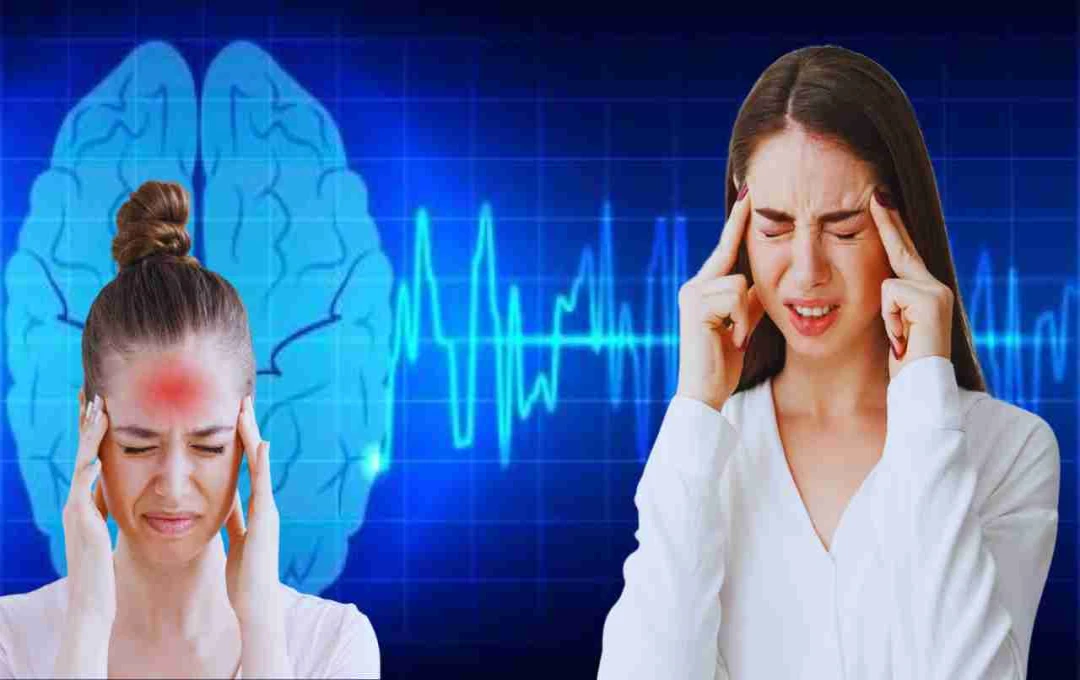Do you often experience a heavy head upon waking up in the morning? Or does a severe headache begin after returning from the office? If yes, this may not be solely due to fatigue or lack of sleep; several other underlying causes could be at play. Headaches have become a common problem in today's fast-paced life. However, people often ignore them and try to find relief with painkillers or tea. But recurrent headaches can also indicate a problem within your body.
Sinus Issues: A Common Cause of Headaches
If, along with a headache, your nose is stuffy, and you feel heaviness around your eyes or cheeks, it could be a sinus headache. Sinusitis occurs when there is inflammation or infection in the air-filled spaces within your head. This is usually caused by a cold, allergies, or changing weather.
What to Do
- Inhale warm steam; this helps clear the nasal passages.
- Wash your face with warm water.
- Stay away from dust, dirt, and allergens.
- Consult a doctor and take prescribed medication if necessary.
Stress and Anxiety

In today's hectic and stressful life, stress has become a common problem. Office pressure, household responsibilities, financial worries, or relationship issues—all these contribute to mental burden. When our brain gets tired or overthinks, it affects the head, leading to headaches. Such pain is called tension headache. This pain usually occurs on both sides or at the back of the head and can persist throughout the day.
What to Do
- Take some time out for yourself every day.
- Practice yoga, meditation, or deep breathing exercises.
- Talk to a trusted friend or family member if needed.
- Get adequate sleep and maintain regular meal times.
Excessive Caffeine Intake or Sudden Cessation Can Also Cause Headaches
If you drink tea or coffee frequently throughout the day and then suddenly stop one day, it can trigger a headache. This is called caffeine withdrawal. When our body gets used to daily caffeine, its sudden cessation shocks the system, causing headaches, irritability, or fatigue.
What to Do
- Reduce caffeine gradually; do not stop suddenly.
- Do not consume more than 1 or 2 cups of tea or coffee per day.
- Drink herbal tea, lemonade, or lukewarm water as alternatives.
Excessive Mobile and Laptop Use Can Also Cause Headaches

Most people spend their days in front of mobile screens, laptops, or TVs—whether for work or entertainment. But did you know that spending excessive time on screens puts a lot of strain on your eyes? This is called eye strain, and it becomes a common cause of headaches.
When we continuously look at screens without breaks, our eyes get tired. This can cause burning, blurring, and pain in the back of the head or temples. Sometimes this pain persists throughout the day or intensifies in the evening.
What to Do to Avoid Headaches
- Look at something distant for 20 seconds every 20 minutes—this is called the 20-20-20 rule.
- Keep the screen brightness low and avoid harsh lighting.
- Wear anti-glare glasses, especially if you wear glasses.
- Do not keep your mobile and laptop too close to your eyes.
- Limit screen time and take breaks in between.
Migraine: A Specific and Painful Cause of Headaches
Migraine is a common but severe headache, often affecting one side of the head. This pain can start mildly and gradually become very intense and throbbing. Migraine pain can last for several hours or even an entire day or two. It is often accompanied by nausea, vomiting, and sensitivity to bright light, loud noises, or b smells. Some people experience warning signs before a migraine, such as flashing lights, dizziness, or numbness. This condition is called migraine with aura.
What to Do for Migraine Relief
- Stay away from bright lights, noise, and crowded places.
- Eat meals on time; skipping meals can worsen migraines.
- Get enough sleep; both lack of sleep and excessive sleep can trigger migraines.
- Avoid stress; practice yoga or meditation daily.
- Always take migraine medication as prescribed by your doctor.
Headaches Caused by Dehydration
If you frequently experience headaches, a major cause could be dehydration. When the body lacks water, the process of delivering blood to the brain slows down. This prevents the brain from receiving sufficient oxygen, leading to a feeling of heaviness or severe pain in the head. This problem worsens in summer as the body loses a lot of water through sweat.
Many people forget to drink water throughout the day or only drink when they feel thirsty, which is not the right approach. Dehydration not only causes headaches but also manifests in symptoms like fatigue, dizziness, dry mouth, and dark urine.
What to Do to Avoid Headaches
- Drink at least 8-10 glasses of water daily.
- Drink 1-2 glasses of water first thing in the morning.
- Include healthy drinks like lemonade, coconut water, or buttermilk.
- Avoid excessive tea and coffee, as they can further dehydrate the body.
- Always keep a water bottle with you and drink regularly.
Lack of Sleep or Excessive Sleep Can Also Cause Headaches
Sleep is essential for the proper functioning of our body. If you regularly get too little sleep or sleep for excessively long periods, headaches are common. Lack of sleep tires the body; the brain doesn't get enough rest, directly impacting the head.
Similarly, when we sleep too much, the balance of chemicals in the brain can be disrupted, causing a heavy or painful head upon waking up. Sleep imbalance also disrupts the body's biological clock, which can worsen headaches.
What to Do to Avoid Headaches
- Develop a habit of getting 7 to 8 hours of sleep daily.
- Establish a fixed sleep and wake-up time and adhere to it.
- Avoid mobile phones, laptops, or TV before sleeping.
- Avoid caffeine or heavy meals at night; these disrupt sleep.
- Keep the sleeping environment calm and comfortable.
When to See a Doctor?

If your headache persists, does not improve with over-the-counter medications, or worsens daily, do not take it lightly and immediately consult a doctor. Especially if the headache is accompanied by vomiting, nausea, difficulty speaking, blurred vision, or weakness in any part of the body. Furthermore, if pain begins after a head injury and persists, it could indicate a serious problem. Ignoring such symptoms can be risky, so it's essential to consult a doctor in a timely manner.
Ignoring frequent headaches is not advisable. They could be a warning sign of a serious underlying health issue. Identify the causes mentioned above, and make small lifestyle changes to find relief. If you have been suffering from headaches for a long time, do not delay—consult a qualified neurologist or general physician. Do not compromise on your health, because a healthy mind is the key to a healthy life.











